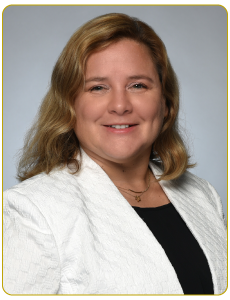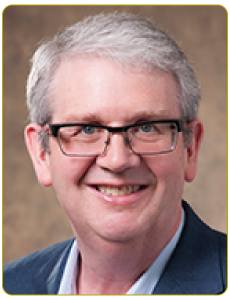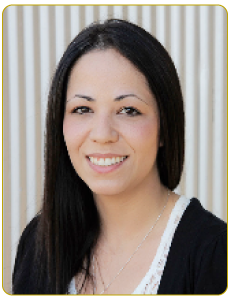Training the Next Generation of Therapists
For Michelle Macera, Ph.D., human interaction is at the core of her work as a professor and a clinician.
 Michelle Macera, Ph.D., teaches the building blocks of psychometrics and cognitive behavior therapy to first-year students at The Chicago School’s Dallas Campus. Her work in the field extends back to her days as an undergraduate psychology major at West Virginia University, where Dr. Macera participated in faculty-directed research projects, and on the strength of her work, was invited to stay on for graduate school.
Michelle Macera, Ph.D., teaches the building blocks of psychometrics and cognitive behavior therapy to first-year students at The Chicago School’s Dallas Campus. Her work in the field extends back to her days as an undergraduate psychology major at West Virginia University, where Dr. Macera participated in faculty-directed research projects, and on the strength of her work, was invited to stay on for graduate school.
“My initial interest was in anxiety disorders, which are the most common mental health problems people face, and I worked in the Anxiety Disorder Lab,” Dr. Macera says. When she first began doing clinical work, she had a client with an eating disorder, and inspired by that interaction, she has published articles and book chapters on anorexia and negative body image.
With her first-year students in the Clinical Psychology Department at The Chicago School, Dr. Macera enjoys teaching psychometrics courses where they learn how tests are created, how to assess the quality of a test, and how to choose the right test for a client. “Other professionals can do therapy,” she says. “You can go to a clinical social worker or a counselor, but assessment and testing—those are specialties of psychology. No other professional can do testing like a psychologist can.”
Dr. Macera also sees her students making connections when she is teaching cognitive behavioral therapy, or CBT, a method of talk therapy commonly employed by clinicians to address negative thoughts or behavior at the root of a condition. She describes a recent class in which the assignment was to demonstrate a CBT skill. “I loved watching them because I didn’t give them a script. They just naturally applied the skills they’d learned,” she says.
As part of her professional development, Dr. Macera has been working pro bono for Outreach Counseling, a Texas organization that provides free or reduced fee mental health services. She sees four clients whose ages range from 19 to 80 with relationship issues, anxiety, and depression. For her, human interaction is at the core of CBT. It is important for students to develop strong clinical interviewing skills so that when they become clinicians, their clients feel comfortable coming to them. Dr. Macera explains, “I say to my clients, ‘Your tears are welcome here. There’s no shame. In fact, it’s a sign of strength and a sign of love.’”
When Theory Meets Practice
As a scholar-practitioner, George Hay, Ph.D., has left his mark in academics and the private sector.
 When George Hay, Ph.D., speaks as a scholar-practitioner, he does so with an authority few others in his field can match. Now in his 13th year of teaching at The Chicago School’s Chicago Campus, this professor of business psychology spent much of his adult life applying his academic training as a psychologist to improving outcomes for global corporations before returning to school for his doctorate.
When George Hay, Ph.D., speaks as a scholar-practitioner, he does so with an authority few others in his field can match. Now in his 13th year of teaching at The Chicago School’s Chicago Campus, this professor of business psychology spent much of his adult life applying his academic training as a psychologist to improving outcomes for global corporations before returning to school for his doctorate.
“I am interested in how scholar-practitioners can leverage their work as consultants to generate breakthrough results within their organizations and contribute to scholarly knowledge in general,” Dr. Hay says. Hailing from a family that boasted five Ph.D.s, he was pursuing a doctorate himself when life intervened. Concerned that raising a young family might not mesh with the incremental nature of advancement in academics, he went looking for a new direction.
He had heard that psychologists were employed in business as market researchers and consumer psychologists and met with a professor in the business school. “I walked in the door at just the right moment,” Dr. Hay exclaims. The man had just signed a big contract to analyze data on New Coke versus Pepsi, and his data analyst had just quit.
Using the skills he’d learned as a psychology student, Dr. Hay was able excel in the field of market research, first at a D.C. consulting firm, and then ultimately at McDonald’s headquarters in Chicago, where he worked for 15 years.
Now a professor at The Chicago School after a decades-long detour, Dr. Hay embraces the role of scholar-practitioner. “The interplay between theory and practice opens up new ways of doing things, and then those practices shed light upon theory,” he says. The last step is to apply this “double benefit” of putting theory into practice toward a third benefit of being an “engaged practitioner.” That means applying this hybrid model where it is needed most, Dr. Hay explains, “like helping leaders to support employees from marginalized communities deal with their ADHD so they can attain the business career that they were born to have.”
Reimagining Behavior Analysis
Annette Griffith, Ph.D., spearheads the new postdoctoral fellow experience in behavior analysis.
 Annette Griffith, Ph.D., associate department chair and research coordinator in the Online Applied Behavior Analysis (ABA) Department, has been instrumental in developing the postdoctoral fellow pilot program at The Chicago School, a result of her work to increase the capacity for student research within her department. Despite her accomplishments, Dr. Griffith says that the decision to enter the field of ABA was something of a fluke. “In Canada at the time, there was only one university program in behavior analysis, and it wasn’t at my school.” But while attending Okanagan University College in British Columbia, she was exposed to ABA while working at a group home and found the experience rewarding.
Annette Griffith, Ph.D., associate department chair and research coordinator in the Online Applied Behavior Analysis (ABA) Department, has been instrumental in developing the postdoctoral fellow pilot program at The Chicago School, a result of her work to increase the capacity for student research within her department. Despite her accomplishments, Dr. Griffith says that the decision to enter the field of ABA was something of a fluke. “In Canada at the time, there was only one university program in behavior analysis, and it wasn’t at my school.” But while attending Okanagan University College in British Columbia, she was exposed to ABA while working at a group home and found the experience rewarding.
Dr. Griffith earned a master’s in behavior analysis in Toronto through a program administered by the University of Nevada, Reno. Moving to the U.S. to pursue a Ph.D. in Educational Studies at the University of Nebraska-Lincoln, she stayed on as faculty there after graduation. Following a stint with the Missouri Department of Mental Health and overseeing a private clinical practice, she joined the faculty of The Chicago School.
Working with Kasey Bedard, Ph.D., the program’s first post-doctoral fellow, Dr. Griffith helped to secure three grants totaling more than $350,000 to develop treatments for children and adults with behavior disorders that do not respond to medication. (To learn more about Dr. Bedard’s work, click here.)
As far back as graduate school, Dr. Griffith began investigating how to apply strategies based on the principles of ABA to a wider range of clinical applications beyond autism, the disorder to which ABA is most commonly linked. This new work is also indicative of a shift at The Chicago School, as the ABA Department begins a new Ph.D. in Behavior Analysis program, which focuses on expanding research and practice for a broader range of issues.
Dr. Griffith hopes that with this expanded focus and new initiatives, like the postdoctoral fellow program, even more graduate students will be able to see the degree of success that Dr. Bedard has enjoyed. “We want to increase the amount of research being conducted at The Chicago School, and, luckily, the mission of our institution allows us to do that in a very student-friendly way,” she says.
Learn more about The Chicago School
To learn more about academic programs at The Chicago School, fill out the information below to request more information. You can also apply today through our application portal here.

